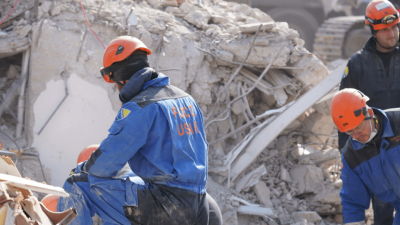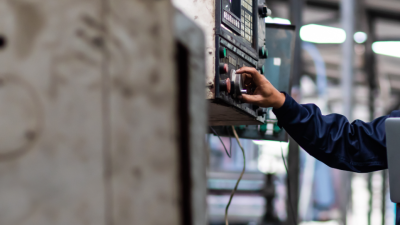
Building a More Resilient Future
Dr Jan Przydatek, Director of Technologies at Lloyd’s Register Foundation, explains how we must embed resilience into our built environment.
This page is approximately a 5 minute read
This page was published on

Four years on, Ohalo’s data anonymisation technology is making work safer on both sides of the Atlantic, and the company’s pipeline is healthy.
“Work on the challenge has led to an ongoing relationship with HSE, new clients in the UK and Ireland construction sectors and an ever-growing list of sectors we operate in including oil and gas, finance and government,” says Kyle.
For those developing new data technologies, Discovering Safety offers a sandbox where the laboratory meets the real world, to explore how emerging technologies such as artificial intelligence can benefit safety at work. It offers companies support across safety-critical sectors such as construction, transport, and energy, by providing a secure environment for investigating the potential of new technologies.
In 2019, Safetytech Accelerator was created as a vehicle for bringing the worlds of data tech and traditional industry together. With funding from Lloyd’s Register Foundation, Safetytech Accelerator has offered start-ups the chance to take part in a three-month pilot project (worth £25k in research time) with Discovering Safety’s data scientists and partners from safety-critical industries.
Working together and learning from the things that work well (as well as those that don't), Discovering Safety is developing intelligent solutions that are creating a safer world of work.
Initially, a London-based tech start-up Ohalo was working on data discovery and anonymisation. Safetytech Accelerator identified them via a pre-pandemic ‘Dragon’s Den’-style pitching competition hosted by Plug and Play in the US and the business has since opened a Trans-Atlantic base in Atlanta, Georgia.
Ohalo developed a product in 2017, the Data X-Ray, to help companies discover their data. Winning the competition allowed Ohalo to apply the Data X-Ray in a safety context, starting with the Health and Safety Executive (HSE)’s vast collection of RIDDOR reports.
Ohalo’s work has huge potential in removing one of the major barriers to sharing sensitive safety data – the need to carefully anonymise it by redacting. This has historically been a prohibitively labour-intensive task, fraught with the potential for error. Ohalo’s technology cuts through mounds of documents, anonymising them reliably, accurately, and speedily.
The need to anonymise data has been a major obstacle to the creation of the large datasets needed to provide HSE with the insights that lead to safety improvements. Ohalo’s project saw 600,000 records anonymised (with 99% accuracy), in an incredible 1.4 days compared to 12.5 years. The trial has led to a successful ongoing collaboration between Ohalo and HSE
Steve Naylor, HSE Senior Scientist and Data Specialist, said: “Back in 2019, HSE put in an industrial challenge to Safetytech Accelerator, centered around the challenges of auto-redacting large volumes of GDPR sensitive research datasets.
The principal driver was the aspiration to promote sharing of health and safety data to stimulate innovation - and the major barrier posed by the risk of breaching data protection legislation. Ohalo won the challenge with their pitch to use their proprietary software platform, Data X-Ray, as a starting point. We ran a pilot project later in 2019 which successfully demonstrated proof of concept.”
Ohalo set up a Data X-Ray server in HSE’s environment to analyse the RIDDOR reports. The server ingested the data to identify sensitive personal data and redacted it. HSE data scientists worked with Ohalo to identify any sensitive information that had not been redacted. When the HSE team spotted any errors such as false positives, the Data X- Ray enabled them to update the models with example training information for a better result next time.
Now working on both sides of the Atlantic with companies in construction, finance, oil and gas and many others, Ohalo’s involvement with Discovering Safety helped it expand its client base and further develop the Data X-ray.
Kyle Dupont, co-founder and CEO of Ohalo, explained:
“We felt from the beginning that our technology could drive real value in anonymising sensitive data from the safety and accident reports that HSE manages, so that the anonymised records can more easily be used by third parties to reduce accidents and fatalities in the UK. However, it was a fairly high-risk project and so Safetytech Accelerator was the perfect vehicle for HSE and Ohalo teams to work together, in iteratively improving the algorithms to get to a point where HSE could use the data.
Work on the challenge led to an ongoing partnership with two construction companies based in the UK and Ireland, Costain and Wood Group. It opened new doors and allowed us to meet new clients and expand our reach,” said Kyle.
Having proved the concept on HSE data, Ohalo is using the same data anonymisation tools in a continuing relationship with Wood Group and Costain. Wood Group were collating hundreds of thousands of safety data records from seven construction firms. They used Ohalo’s Data X-ray to redact the records automatically, so they could be securely shared and used to learn lessons from.
“We’re also working with banks, governments, law enforcement agencies and safety-critical industries such as the oil and gas sectors on redaction, discovery, classification, and records and retention management.”
As well as expanding its client base, working with Discovering Safety has also allowed Ohalo to develop its key product, the Data X-ray.
“It gave us a safe springboard which allowed us to develop the Data X-ray’s capabilities further,” said Kyle. “Starting from a base of 100,000 words, it can now redact, to a high degree of accuracy, millions of words per second.”
Ohalo’s work with Discovering Safety has been a springboard to a future where learning can be extracted easily from massive quantities of safety data, which will lead to the most important outcome of all – saving lives and preventing injuries in the workplace.
“The great work we did between us will hopefully change the lives of many workers for the better.”
To find out more about working with Discovering Safety, visit their website.